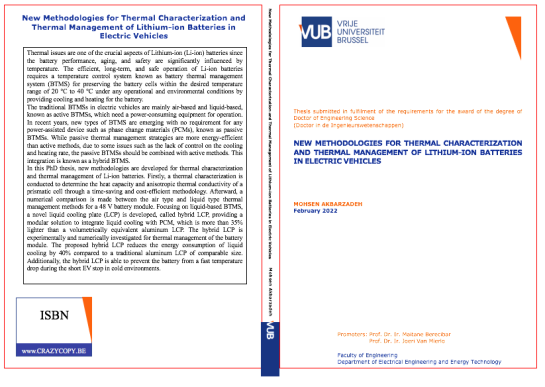
Thermal issues are one of the crucial aspects of Lithium-ion (Li-ion) batteries since the battery performance, aging, and safety are significantly influenced by temperature. The efficient, long-term, and safe operation of Li-ion batteries requires a temperature control system known as battery thermal management system (BTMS) for preserving the battery cells within the desired temperature range of 20°C to 40°C under any operational and environmental conditions by providing cooling and heating for the battery.
The traditional BTMSs in electric vehicles are mainly air-based and liquid-based, known as active BTMSs, which need a power-consuming equipment for operation. In recent years, new types of BTMS are emerging with no requirement for any power-assisted device such as phase change materials (PCMs), known as passive BTMSs. While passive thermal management strategies are more energy-efficient than active methods, due to some issues such as the lack of control on the cooling and heating rate, the passive BTMSs should be combined with active methods. This integration is known as a hybrid BTMS.
In this PhD thesis, new methodologies are developed for thermal characterization and thermal management of Li-ion batteries. Firstly, a thermal characterization is conducted to determine the heat capacity and anisotropic thermal conductivity of a prismatic cell through a time-saving and cost-efficient methodology. Afterward, a numerical comparison is made between the air type and liquid type thermal management methods for a 48 V battery module. Focusing on liquid-based BTMS, a novel liquid cooling plate (LCP) is developed, called hybrid LCP, providing a modular solution to integrate liquid cooling with PCM, which is more than 35% lighter than a volumetrically equivalent aluminium LCP. The hyrbrid LCP is experimentally and numerically investigated for thermal management of the battery module. The proposed hybrid LCP reduces the energy consumption of liquid cooling by 40% compared to a traditional aluminium LCP of comparable size. Additionally, the hybrid LCP is able to prevent the battery from a fast temperature drop during the short EV stop in cold environments.
